The Secret Cardinal Read online
Page 7
10
Donoher sat alone in a well-lit conference room in the catacombs. The table before him held several stacks of files covering all aspects of the Vatican’s preparations for the upcoming papal funeral and the subsequent conclave. After Pope Leo XIV named him camerlengo, Donoher’s predecessor, Cardinal Mizzi, forwarded to him a file box of information he had collected over the years in preparation for this day. Included were copies of letters from previous camerlengos about their experiences during past interregnums. Donoher found comfort in the wisdom of those men who had carried this burden before him.
The triangular speaker in the center of the conference table chimed. Donoher glanced at the caller-ID. It was his executive assistant, Sister Deborah.
“Yes, Sister?”
“Your Eminence, the video link you requested is ready.”
“Thank you.”
As he set aside the file he was reading, the flat monitor covering a large portion of the opposite wall filled with a test screen showing the logo of the Holy See. The still image quickly disappeared, replaced by a view inside another subterranean conference room thousands of miles away. Two men gazed back at him. Both appeared lean and fit for their age. The man on the left had a full head of silver hair; the other displayed only hints of gray around the edges. They were dressed in well-tailored suits, and the left lapel of each held a pin of the American flag. Donoher personally knew the man on the left; it was through the CIA director that he had requested this meeting. He recognized the man seated beside Jackson Barnett, though this was the first time he had ever spoken to him.
“Your Eminence,” the president began in a folksy west Texas drawl, “I would first like to express my deepest condolences and those of the people of the United States on the passing of Pope Leo. I was privileged to have met with him on several occasions and benefited from his wisdom. The pope was a man of great faith and compassion, truly one of the most inspiring leaders on the world stage. He will be missed.”
“He will indeed, Mister President, he will indeed. Thank you for your kind words.”
“Kind words come easy when they’re the truth. Director Barnett informs me you have a delicate matter you’d like to discuss with us.”
“That is correct, Mister President. Are you familiar with the case of Yin Daoming, the Roman Catholic bishop of Shanghai?”
“Chinese dissident,” the president recalled. “Been locked up for decades for being nothing more than a man of the cloth. He’s got some family here in the U.S., in Connecticut. I’ve worked with one of the senators from up there to quietly prod Beijing into letting him go. Talks on that have never gotten anywhere.”
“That has been our experience as well,” Donoher said. “In August, the Chinese government murdered approximately five hundred of its citizens in a failed attempt to force Bishop Yin into publicly renouncing the Roman Catholic Church and the pope. Following this incident, His Holiness directed me to find a way to unilaterally free Bishop Yin.”
“Sounds like you’re talking about a prison break,” the president said wryly.
“Yes, Mister President. We have devised a nonviolent way to free Bishop Yin. Just before his death, Pope Leo authorized us to proceed.”
“Is this why Nolan Kilkenny is in Rome?” Barnett asked.
Donoher nodded. “I needed someone with his particular background to study the problem, to see if our aim was even possible.”
“Kilkenny,” the president mused, then he turned to Barnett. “That the same fella who nailed the folks behind the attacks of the shuttle Liberty and that Chinese rocket?”
“Shenzhou-7, Mister President,” Barnett offered. “And yes, the gentleman working with Cardinal Donoher is the same man you remember from that incident.”
“He sure gets around.” The president chuckled. “The work Kilkenny did last year put a bit of a thaw in our relations with the Chinese—nothing earth-shattering, mind you, but the tone has improved. Too bad we had to keep the wraps on that story—in my mind, the Chinese owe Kilkenny a medal.”
“What you’re proposing will infuriate Beijing,” Barnett said to Donoher.
“The continued existence of the Roman Catholic Church in China infuriates Beijing. From the point of view of the Holy See, we have nothing to lose in freeing Bishop Yin.”
“But the United States stands to lose a great deal if we’re implicated in any way,” Barnett countered.
“Cardinal, if you have a plan that you think will work, why come to us?” the president asked. “You have to know that even minor involvement on our part would be politically difficult for the United States.”
“The pope’s death has made time a serious problem for us. In as little as fifteen days, the Church may have a new pope, at which time my directive from Pope Leo will, in all likelihood, be rescinded. We cannot possibly train our own people, get them into place, and free Bishop Yin in so short a time.”
“What makes you so sure the new pope won’t finish what Pope Leo started?”
“Mister President, you yourself know how difficult it is to make a decision that will put people in harm’s way. Pope Leo agonized for years over what to do about Bishop Yin, but after the August tragedy he found his patience at an end. I fear it will take years for the new pope, whomever he is, to reach the same conclusion—years that Bishop Yin may no longer have.”
“What do you need?” the president asked.
“Logistical support and manpower. Kilkenny intends to lead the team in himself. He wants to assemble a small force of volunteers who would be provided with new identities to conceal their ties to the United States.”
“Special Forces,” Barnett said. “Kilkenny was a SEAL and still has contacts in the service, including Admiral Dawson.”
“I thought you said your plan was nonviolent,” the president said.
“It is, Mister President,” Donoher replied, “and if everything proceeds as we hope, Beijing won’t realize what has transpired until long after Kilkenny and his team have Yin out of the country.”
“And if everything doesn’t go right, a handful of highly trained U.S. commandos might get themselves killed or captured inside China.” Barnett shook his head. “Mister President, this is a very dangerous thing to do.”
“So this jailbreak was Pope Leo’s dying wish?” the president asked.
“It was,” Donoher replied.
The president thought for a moment before he spoke. “Freeing Bishop Yin would certainly have a lot of symbolic value, but the bottom line is it’s the right thing to do. If it pisses off Beijing, well, we’ll deal with it. Jackson, you’re my point man on this operation. I want you to help Cardinal Donoher pull off this jailbreak, but make sure we have at least a fig leaf of deniability.”
“Yes, Mister President,” Barnett replied.
“And Cardinal, best of luck to you on this worthy endeavor. Perhaps we’ll have a chance to talk further in Rome after the funeral. Pope Leo left a great legacy.”
“I look forward to it, Mister President.”
11
LANGLEY, VIRGINIA
Jackson Barnett pressed the button for the seventh floor, an action repeated so many times it no longer required conscious thought—which was good, as he was concerned with a difficult problem. The director of Central Intelligence (DCI) knew the agency’s activities in nations hostile to the United States carried an element of risk to the men and women involved. Nothing saddened Barnett more than the somber convocations held in the cavernous lobby, where he unveiled new additions to the constellation of black stars chiseled into the white marble wall. The stars represented the CIA’s honored dead.
The doors slid open, and Barnett headed purposefully toward his office.
“Is the link set up?” Barnett asked as he approached the desk of his assistant, Sally Kirsch.
“They’re waiting for you now,” Kirsch replied.
Entering his office, Barnett’s eyes immediately darted to the flat rectangular display mounted on his wa
ll. The conversation between the two people pictured there ceased as soon as he walked into view of the camera mounted atop the screen. On the right half of the split image sat Kilkenny, likely in the same Vatican conference room from which Donoher had spoken to the president a few hours earlier. Kilkenny looked tired and a bit disheveled in a sweatshirt and jeans, though Barnett had seen him in far worse condition on several occasions over the past few years.
Beside Kilkenny—virtually, though in reality in a MARC conference room in Ann Arbor, Michigan—sat a beautiful young woman with long black hair and almond eyes. Roxanne Tao was dressed impeccably in a tailored suit. Barnett knew her to be a professional who went to great lengths to look and act the part. Pinned to Tao’s lapel was a gold Chinese character representing the word Qi—the name of the CIA-backed venture-capital firm she represented in Ann Arbor.
“Good morning, Roxanne,” Barnett said, his South Carolina baritone rich with warmth. “I hope this impromptu meeting didn’t disrupt your day too much.”
“Nothing that can’t be rescheduled,” Tao replied.
“Good evening, Nolan.”
Kilkenny acknowledged the DCI’s perfunctory greeting with a nod as he sipped on a Diet Coke. Barnett set his briefcase down beside the desk but remained standing. A prosecutor before embarking on a long and distinguished career with the agency, Barnett found he did some of his best thinking on his feet.
“Has Nolan briefed you on his latest project?” Barnett asked Tao.
“No, we were just catching up. It sounds as if things are a little crazy in Rome right now.”
“I have no doubt an element of madness is at work.”
Kilkenny eyed Barnett curiously as he spoke. Donoher had warned him that the DCI was less than enthusiastic about liberating Yin.
“I am just now returning from the White House,” Barnett continued, speaking directly to Tao, “where the president and I had a most interesting conversation with Cardinal Donoher. As you may or may not know, the cardinal was responsible for hiring Nolan as a consultant to the Vatican. Following the pope’s death, Cardinal Donoher assumed stewardship of the Vatican City State and the Holy See. The subject of our conversation was a Roman Catholic bishop and Chinese dissident named Yin Daoming. Do you know of Bishop Yin?”
“To many in China, Bishop Yin is a heroic figure, a man of great courage and honor,” Tao replied. “That he is imprisoned is a crime.”
“Until a few days ago, I’m sad to say I’d never heard of Bishop Yin,” Kilkenny admitted.
“It’s not surprising,” Tao said. “He is little known outside of China, and in China his name is mentioned only with great discretion.”
“Nolan, would you care to illuminate Roxanne on what you’ve been working on for the Vatican?” Barnett asked.
“I’m going to get Bishop Yin out of China, and I’d like your help.”
“Of course,” Tao replied. “What do you need me to do?”
“You spent a lot of time in China—I need your experience. I also need to procure some items over there, so if you still have any contacts that you trust, I need them too. And once our team is in place, I’ve got the role of a lifetime for you to play.”
“I’m certain Nolan wouldn’t ask you to set foot in China if he had any idea of the risk it poses to you and to his mission,” Barnett said to Tao. “And since I have been ordered to provide covert support for this venture, I feel compelled to make full disclosure about your past work in China.” Barnett turned to Kilkenny. “You already possess the appropriate security clearance for this information, Nolan, and now you have the need to know. Roxanne, tell him.”
As Tao collected her thoughts, Barnett sat down in a brown leather chair, careful to remain in the camera’s field of view.
“In the eight years prior to my arrival in Ann Arbor, I was a deep-cover agent for the CIA in Beijing. I was, in the parlance of my profession, an illegal. I had no papers, no diplomatic immunity, no status as a U.S. citizen. If caught, I would have been tried for espionage and, after a thorough interrogation, executed. Those were the rules governing my existence.
“For eight years, I was native Chinese. During that time, I built several cells of agents in various government ministries and businesses. My agents produced volumes of intelligence on the actions and intentions of Beijing, information that even led to the disruption of a network of Chinese agents working in the United States.
“In China, I also built a personal life and formed relationships with many people who played no part in my work. I even fell in love and was engaged to be married. I became the person I pretended to be, lived the role as if I’d been born to it, as if Roxanne Tao of California was a fiction and Chen Mei Yue of Beijing was real. In living with the fear that the government could arrest me at any time, I was no different from most ordinary Chinese. The people of China have lived for thousands of years with a government-induced form of paranoia.
“I spent most of my last year in China on the run, my cover blown, my Chinese life in ruins. Many of my cells were exposed, my agents arrested and killed. Some sacrificed themselves to ensure my escape. A few of my people remain in place, dormant, living in dread that the next knock at the door will either be the police, or perhaps me.”
Kilkenny studied Tao as she spoke and sensed equal amounts of anguish and relief. The rules of secrecy with which she lived meant that eight years of her life had to be kept separate, repressed in her memory as something she didn’t truly own and could never admit to possessing.
“The very success of Roxanne’s operation in China set the stage for her undoing,” Barnett added. “The Chinese knew something was afoot but had no way to gauge the extent. So, being well versed in the teachings of Sun Tsu, they found an inward spy here at Langley who accepted their generosity in exchange for information. The career of the gentleman in question as a mole didn’t last long enough to spend even a fraction of his ill-gotten wealth, but the damage he caused in human terms was immense.
“Chen Mei Yue is a known spy of the United States. The Chinese have photographs of her, fingerprints, probably even DNA because she fled her apartment just moments ahead of the police, leaving everything behind. Chen is a wanted fugitive, and the Chinese are still looking for her. Asking Roxanne to return to China is tantamount to asking her to commit suicide.”
“Nonetheless, I’m going,” Tao declared.
“I can’t ask you to do that,” Kilkenny said.
“You can’t ask me to remain behind, either,” Tao countered. “Not now that I know what you’re after. It may be a danger for me to go, but how much more of a danger is it for you to go without me?”
“Roxanne,” Barnett said, “I caution you against returning.”
“I’m going in surrounded by a team of meat eaters,” Kilkenny added, “all big boys who can handle themselves if the merde hits the ventilateur électrique. You don’t have to go.”
“Yes, I do.”
“Why?” Kilkenny asked softly.
“My fiancé was an underground Roman Catholic. I was the spy, and yet Ming kept his secret from me for years. At first, he hid his faith to protect himself, but as our relationship grew he maintained the secret to protect me. Eventually we shared our secrets and planned to have our marriage blessed by a priest. I was raised a Christian but was never very religious until I fell in love with this man. When my cover was blown, Ming hid me in the community of his underground church. He could have saved himself, in fact I urged him to, but in the end he died to protect me.
“What I learned from Ming and the others who sheltered me when I was on the run was the fierce loyalty the Roman Catholics in China have toward one another. I asked Ming why this was so, and he said it was Bishop Yin. Yin stayed with his people when he could have fled. He lived the words he preached. Ming followed that example, and I am alive because of his sacrifice.” Tao’s eyes brimmed with tears as she dredged through her store of memories. “In any other case, I would agree with you both about the dangers
of my returning to China, but for Ming and the others who saved my life, I must do this.”
As Tao spoke, Kilkenny recalled her boundless support in the days after his wife and son died. Family and friends offered heartfelt sympathy, of course, but in hindsight only Tao seemed to comprehend the depth of his grief and anger. What he had assumed was tremendous empathy he now realized was a wound they shared in common.
“I see there will be no dissuading you,” Barnett conceded, “so we must do everything possible to keep you off Beijing’s radar.”
12
CORONADO, CALIFORNIA October 16
Max Gates stood atop the dune surveying the carnage below. A stocky, barrel-chested man with forearms that would make Popeye proud, he was clad in a battle-dress uniform of woodland-pattern camouflage with the pants bloused into a pair of black Bates 924/922 boots. The master chief’s sandy-brown hair had receded to nothing-ness long before it had the opportunity to turn gray, though what he lost on top he made up for in a pair of bushy eyebrows and a thick handlebar mustache.
Explosions and gunfire shattered the night, war in all its fury unleashed on a thin strip of sand along the Pacific Coast. The air was thick with smoke, the harsh smell of cordite strong and familiar to CMC Gates—the command master chief and senior enlisted adviser charged with the training of recruits for the Navy’s elite SEAL teams.
The CMC stood next to Captain Hunley, the CO and an officer with as many years in the teams as the master chief. Both men were veterans whose vast wealth of experience in this particular brand of warfare was now employed to shape the next generation of naval Special Forces.
On the beach below, the instructors serving under Hunley and Gates set off grenade and artillery simulators, fired full-auto bursts from M-60 machine guns, and shouted commands at the increasingly confused and disoriented class of recruits. Push-ups, sit-ups, flutter kicks, and dive bombers—the instructors drove the recruits through a punishing regimen of physical training exercises, all while soaking the young men with icy blasts from fire hoses. Sand coated every inch of the sodden recruits’ bodies, working through their clothing and grinding in every crevice.

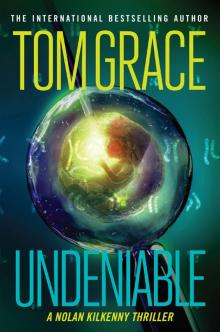 Undeniable
Undeniable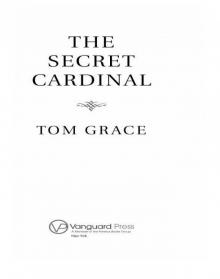 The Secret Cardinal
The Secret Cardinal Spyder Web
Spyder Web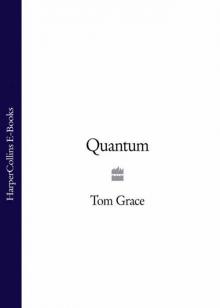 Quantum
Quantum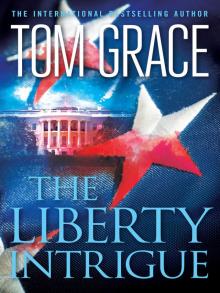 The Liberty Intrigue
The Liberty Intrigue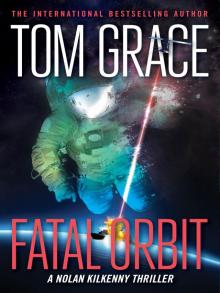 Fatal Orbit
Fatal Orbit